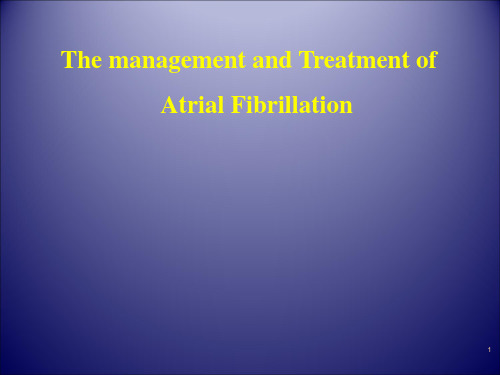老年病学英文课件:Dyslipidemia in elderly
- 格式:pptx
- 大小:663.93 KB
- 文档页数:74






老年抑郁症英语Depression in the ElderlyGrowing old can be a daunting experience. As the body and mind begin to slow down, seniors often face a myriad of challenges that can take a toll on their mental health. One of the most prevalent issues among the elderly population is depression, a condition that affects not only their quality of life but also their overall well-being.Depression in the elderly is a complex and multifaceted problem, influenced by a variety of factors. As people age, they may experience significant life changes, such as the loss of a spouse, the onset of chronic health conditions, or the transition to a retirement lifestyle. These events can trigger feelings of loneliness, grief, and a sense of loss of purpose, all of which can contribute to the development of depression.Moreover, the physiological changes that occur with aging can also play a role in the onset of depression. Older adults may experience decreased cognitive function, reduced mobility, and changes in sleep patterns, all of which can exacerbate depressive symptoms. Additionally, certain medications commonly prescribed to the elderly,such as those for hypertension or Parkinson's disease, can have side effects that can lead to or worsen depression.Despite the prevalence of depression among the elderly, it is often underdiagnosed and undertreated. Many older adults may be reluctant to seek help, either due to a perceived stigma associated with mental health issues or a belief that depression is a natural part of the aging process. Furthermore, healthcare professionals may overlook or dismiss depressive symptoms in their elderly patients, attributing them to the normal effects of aging rather than recognizing them as a treatable condition.The consequences of untreated depression in the elderly can be severe. Depressed seniors are at an increased risk of developing physical health problems, such as cardiovascular disease, stroke, and cognitive decline. They may also experience a diminished quality of life, with decreased social engagement, decreased physical activity, and an overall sense of hopelessness and despair.Fortunately, there are effective treatments available for depression in the elderly. Cognitive-behavioral therapy (CBT) and other forms of psychotherapy can help seniors develop coping strategies and address the underlying causes of their depression. Antidepressant medications, when prescribed and monitored appropriately, can also be an effective treatment option. In addition, lifestyle changes, suchas regular exercise, social engagement, and the pursuit of meaningful activities, can play a significant role in managing depressive symptoms.It is crucial that healthcare providers, caregivers, and the general public become more aware of the prevalence and impact of depression in the elderly population. By recognizing the signs and symptoms of depression and encouraging older adults to seek help, we can work towards reducing the burden of this debilitating condition and improving the overall well-being of our aging population.In conclusion, depression in the elderly is a pressing public health issue that requires a multifaceted approach. By addressing the unique challenges faced by older adults, providing appropriate treatment and support, and fostering a greater understanding of this condition, we can help to ensure that the golden years of life are filled with joy, purpose, and a sense of well-being.。